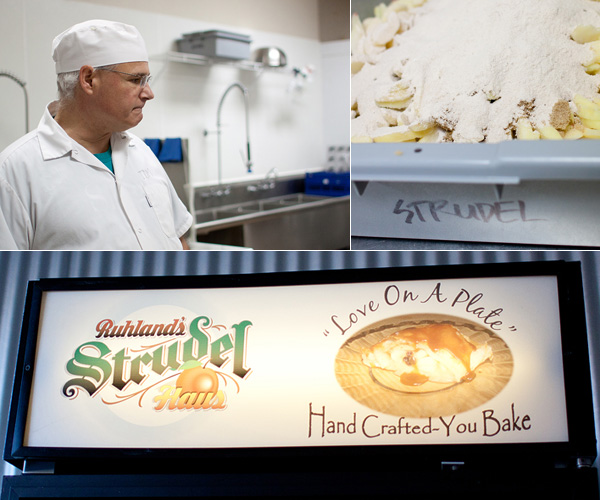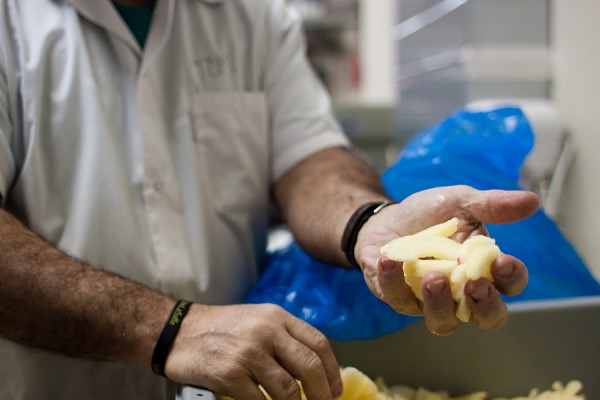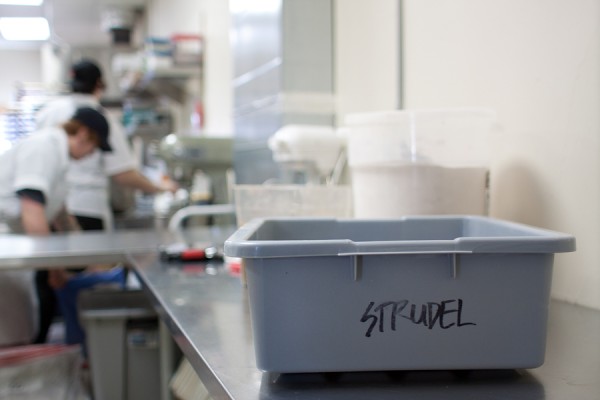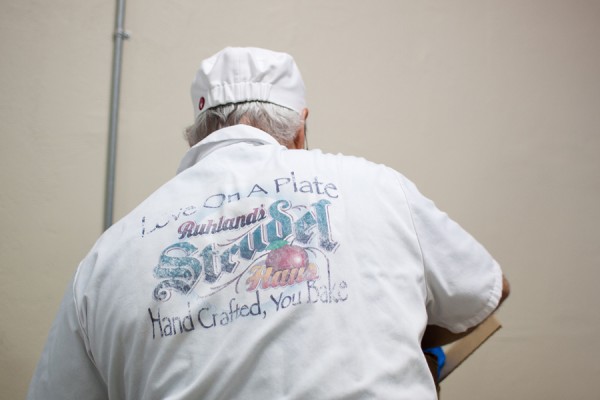
Sometime around late August every red-blooded Minnesota has some variation of this thought, “I could do this. I could set up shop at the Fair. I’d work hard for two weeks and be set for the remaining 50. Maybe go fishing.”
Back in the mid-nineties, Tom Ruhland had that same thought. “I was playing around with puff pastry at the time. That evolved into apple strudel,” Ruhland says. It’s exactly the sort of dish you can imagine buying, on a stick, just off the Midway.
But Ruhland, like most of us, eventually shelved his State Fair dreams. The difference is that he kept refining his apple strudel. In 2002 he and his brother bought a concession trailer and took Ruhland’s Strudel Haus on the road to small fairs and community events. Happy customers kept asking where else they could buy the strudel, so, five years ago, Ruhland’s Strudel Haus jumped on the farmers market circuit.
“The carnie life is a hard life,” Ruhland says. “Now I like making food, freezing it, and having people take it home to feed their families.” Ruhland still takes the concession trailer to a dozen or so events each year, and sells at seven farmers markets during the summer, but you can also find his strudels at a handful of retail outlets and through the grocery delivery service Coborn’s. He even has a growing stream of fundraising clients. It all adds up to 10 to 15,000 strudels a year in 35 varieties.

On a cold day in December, Ruhland and his friend and assistant Fred Wysoki are at Bonus Vivus, a small shared commercial kitchen in St. Paul, making 60 apple strudels for a German immersion school’s fundraiser. They had ordered 250 in all.
Wysoki arranges sheets of parchment on the metal work surface, and on top of each of those a sheet of frozen puff pastry. Best Brands, in Eagan, makes the dough to Ruhland’s specifications, without trans fats. “It took them a while to get on board with that,” Ruhland says. But he had already talked with enough potential customers to know that’s what his product had to be to find a foothold.
Wysoki, who’s a bigger guy, hefts a 30-pound box of frozen Pepin Heights Haralsons lightly onto his shoulders and takes it out the back door to the sidewalk. Dropping it a few times loosens the apple slices. Ruhland tosses the apples with big, meaty handfuls of what he calls “magic dust”: a mix of flour, sugar, cinnamon, and generous amounts of nutmeg. And maybe a secret ingredient or two.
The apple mixture is now ready to be scooped out onto the sheets of puff pastry. Thirty pounds of apples makes 30 strudels.
“We try to use as much local produce as week can,” Ruhland says. In the spring he orders up asparagus from Lorence’s Berry Farm in Northfield and hundreds of pounds of rhubarb from Lanesboro, the “Rhubarb Capital of Minnesota.”
“Given what we do, though, we’re shaped by economics, too,” Ruhland says. “I used to pick my own spinach from a guy’s farm in Little Canada. He grows the best spinach. But that’s more work than I have time for now. I have to be in the kitchen making strudel.”

You’d think that the classic apple strudel would be Ruhland’s biggest seller. But he says that honor goes to the spinach, feta, and artichoke heart variety, which sells two-to-one over any other strudel. It’s hard not to imagine gooey, green-flecked slices being served up at every book club meeting in the Twin Cities. His own go-to for the family table is turkey, cranberry, and Swiss. And his newest creation is fig, honey, and goat cheese. “That’s for the foodies,” he says and tips his nose good-naturedly into the air. He’s got some meaty varieties, too, like cheeseburger and chicken marinara, and he’s working on recreating a Philly cheesesteak wrapped in puff pastry. “But we won’t use Cheez Whiz, like they do.”
“This is a blank canvas. That’s all it is,” he says, gesturing to the waiting pale yellow rectangles. “It’s the best puff pastry commercially made.”
On the other side of the kitchen at Bonus Vivus, two pierced young bakers are weighing gluten-free dough onto pizza pans. “That’s one thing I really like about this,” Ruhland says. “We get to work around amazing, fun people. I know people in the food business who are very stingy with information. That’s a bunch of bullshit. If I can do anything to help someone else out, I will.”
Ruhland sees his business growing in the future, maybe taking up a whole kitchen instead of a corner of the countertop, with five or more employees, all making a livable wage with benefits. From strudel.
“I don’t want to get rich,” Ruhland says. “I just want to make a living making people happy eating our food.”


from one of the parents at that German immersion school: it’s some of the strüdel ever.
I am more likely to buy it, knowing that ingredients are locally sourced & he holds business idea of treating employees well.